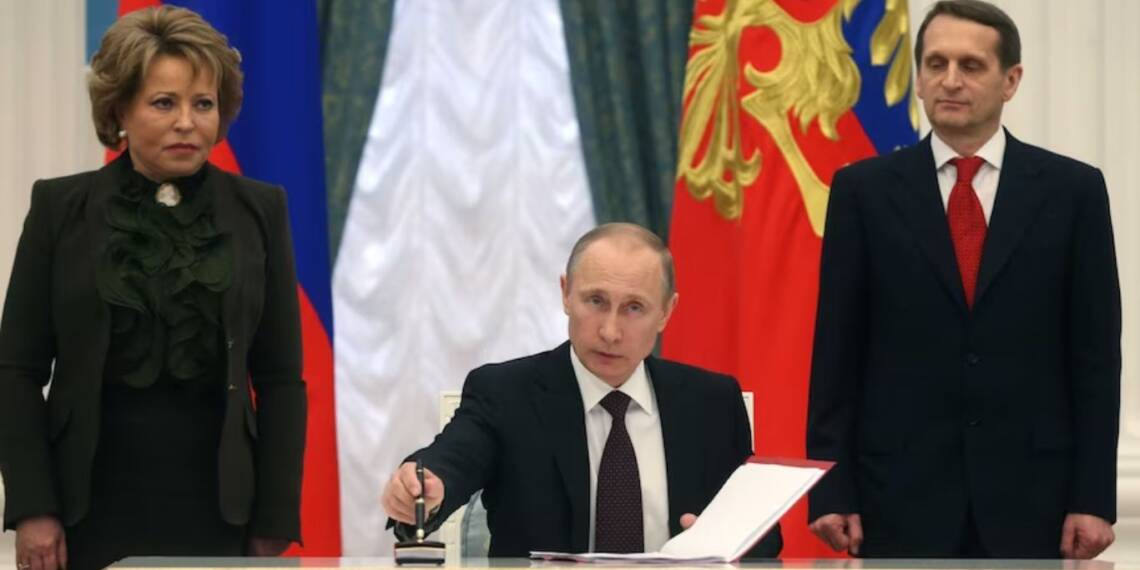The European Union started a very ambitious project to decouple itself from Russia in 2022. Be it energy, be it grains, be it fuel, or even weapons, decoupling has been the only agenda. However, it is not like Russia-EU tensions existed even before that.
The Crimea clash of 2014 fueled by the Obama administration triggered Russia’s exit from G7. The members kicked Putin out. However, the Biden administration made it ardent that let’s make Russia-Europe such a rival that they abhor each other even to the point of war.
The cabal of Brussels, the elite followers of the deep state followed the lines of sanctions and whatnot. But now Trump is back in the White House and his agenda seems to be troubling Brussels even in dreams.
Trump has made one thing clear to Europe, cutting ties with Russia isn’t really an option. U.S President Donald Trump recently stated that he wants Russia back in what was once the Group of Eight (G8), calling the decision to remove Russia a decade ago a “mistake.” Speaking to reporters in the Oval Office, Trump said, “I’d love to have them back. I think it was a mistake to throw them out.”
Trump added, “I think (Russian President Vladimir) Putin would love to be back. Obama and a few others made a mistake by pushing Russia out. If it were still the G8, maybe the Ukraine issue wouldn’t have happened.”
Trump also mentioned that he and Putin have agreed to push forward with denuclearization efforts “in a very big way.” He said, “There’s no need for us to keep building brand-new nuclear weapons. We already have enough to destroy the world 50 times over, maybe even 100 times over.” He added, “China’s trying to catch up, though.”
For those who don’t know, the G8 was formed in 1997 when Russia officially joined as the eighth member, allowing it to regularly discuss global issues alongside the G7 nations—Britain, Canada, France, Germany, Italy, Japan, and the US.
However, Russia was kicked out in March 2014 after it occupied and annexed Crimea, a region of Ukraine. This move was led by the US under then-President Barack Obama. Since then, the group has reverted to the G7, which continues to operate without Russia.
The G7 functions as an informal bloc of the world’s advanced economies, coordinating policies on global trade and security. In trade, it shapes international economic policies, addresses supply chain resilience, sets standards for digital commerce, and works on currency stability. The group also develops joint responses to economic challenges and sanctions against hostile nations. Russia was also a part of it.
On defense, G7 aligns military strategies, coordinated responses to global threats, shared intelligence, and develops common positions on security challenges. It also manages defense technology transfers among members and establishes unified approaches to military modernization and cybersecurity threats.
But once the seeds of hatred were planted, Europe didn’t waited for a minute to expel Russia.
And since then, Russia is like Europe’s nightmare, for what reasons no one knows. Since the escalation of the Ukraine conflict in 2022, the EU has made significant strides in decoupling from Russia, particularly in energy and finance. Sanctions have cut Russia off from Western financial systems, and the EU has reduced its reliance on Russian energy, shifting to liquefied natural gas (LNG) imports from the US and other sources, despite higher costs. Lithuania, for instance, is set to disconnected from the Russian energy grid in February 2025.
Germany and France have taken contrasting approaches to decoupling from Russian energy, reflecting their differing levels of dependence. Germany, which relied on Russia for 55% of its gas, 35% of its oil, and 45% of its coal in 2021, has significantly reduced its Russian gas imports from 55% to 35% between February and mid-April 2022.
It has also accelerated renewable energy investments, aiming for 80% renewable electricity by 2030, and introduced measures like heat pump deployment and building retrofits to cut gas demand. France, less dependent, has maintained stable gas imports but pushed for broader EU sanctions, including an oil
Embargo.
Trump’s potential move to bring Russia back into the fold could derail years of European efforts to reduce dependency on Moscow. The EU’s ambitious decoupling project, spanning energy, trade, and defense sectors, may face significant hurdles if the U.S. shifts its stance. This could weaken the collective Western position and put European allies in a difficult position – all the plans to isolate Russia goes down in vain in just one single statement.







